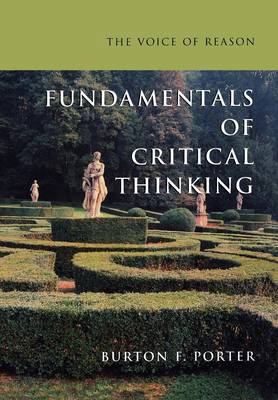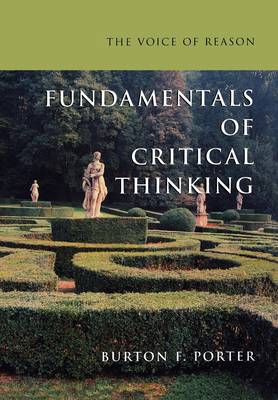
- Retrait gratuit dans votre magasin Club
- 7.000.000 titres dans notre catalogue
- Payer en toute sécurité
- Toujours un magasin près de chez vous
- Retrait gratuit dans votre magasin Club
- 7.000.0000 titres dans notre catalogue
- Payer en toute sécurité
- Toujours un magasin près de chez vous
249,45 €
+ 498 points
Description
Lively, comprehensive, and contemporary, The Voice of Reason: Fundamentals of Critical Thinking covers three principal areas: thought and language, systematic reasoning, and modes of proof. It employs highly accessible explanations and a multitude of examples drawn from social issues and various academic fields, showing students and other readers how to construct and criticize arguments using the techniques of sound reasoning.
The Voice of Reason examines the traditional elements of the field and also explores new ground. The first section of the book elucidates the relationship between thought and language, explaining how words function. It discusses meaning, connotation, vagueness, ambiguity, and definition, identifying the linguistic elements that can produce mistakes in thinking. The next section describes the rules of systematic reasoning, examining such topics as truth, relevance, and adequacy; deductive logic (categorical, hypothetical, and disjunctive); and induction (cause and effect, analogy, generalization, and hypothesis). Sixteen fallacies in thinking are also described through extensive illustrations and applications. The final section of the book offers a unique study of what constitutes proof in several different areas--including politics, advertising, law, and social issues--as well as in the academic disciplines of literature, science, history, and ethics. The author describes the various rules of evidence, using essays by major figures in each field as examples.
An ideal text for courses in critical thinking, informal logic, and reasoning and writing, The Voice of Reason offers numerous pedagogical features including a host of examples; assignments, exercises, and puzzles at both the halfway point and at the end of each chapter; cartoons and quotations throughout; and practical applications of theoretical concepts. An extensive Instructor's Manual contains answers to the exercises that appear throughout the text.
The Voice of Reason examines the traditional elements of the field and also explores new ground. The first section of the book elucidates the relationship between thought and language, explaining how words function. It discusses meaning, connotation, vagueness, ambiguity, and definition, identifying the linguistic elements that can produce mistakes in thinking. The next section describes the rules of systematic reasoning, examining such topics as truth, relevance, and adequacy; deductive logic (categorical, hypothetical, and disjunctive); and induction (cause and effect, analogy, generalization, and hypothesis). Sixteen fallacies in thinking are also described through extensive illustrations and applications. The final section of the book offers a unique study of what constitutes proof in several different areas--including politics, advertising, law, and social issues--as well as in the academic disciplines of literature, science, history, and ethics. The author describes the various rules of evidence, using essays by major figures in each field as examples.
An ideal text for courses in critical thinking, informal logic, and reasoning and writing, The Voice of Reason offers numerous pedagogical features including a host of examples; assignments, exercises, and puzzles at both the halfway point and at the end of each chapter; cartoons and quotations throughout; and practical applications of theoretical concepts. An extensive Instructor's Manual contains answers to the exercises that appear throughout the text.
Spécifications
Parties prenantes
- Auteur(s) :
- Editeur:
Contenu
- Nombre de pages :
- 384
- Langue:
- Anglais
Caractéristiques
- EAN:
- 9780195141221
- Date de parution :
- 09-08-01
- Format:
- Livre broché
- Format numérique:
- Trade paperback (VS)
- Dimensions :
- 165 mm x 237 mm
- Poids :
- 580 g

Les avis
Nous publions uniquement les avis qui respectent les conditions requises. Consultez nos conditions pour les avis.






